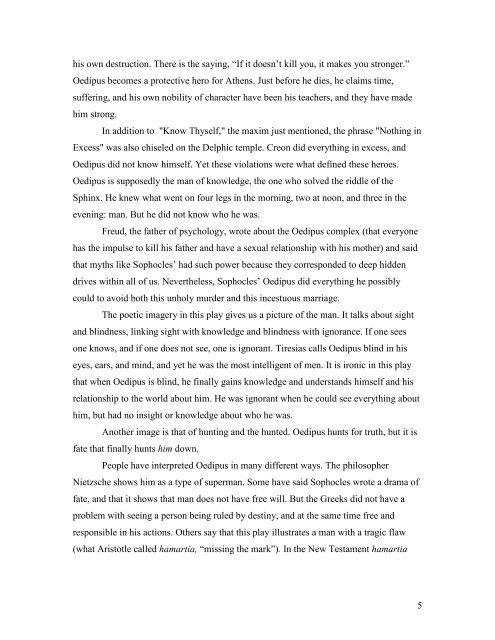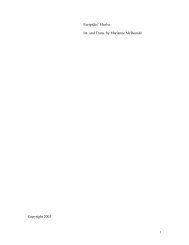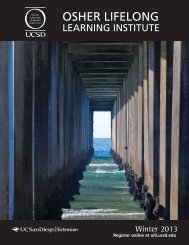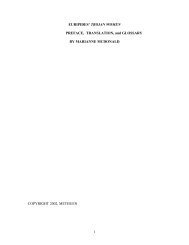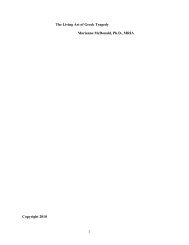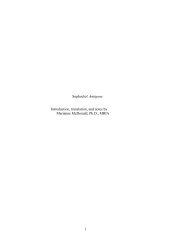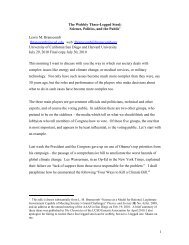1 Sophocles' Oedipus Tyrannus Introduced and Translated by ...
1 Sophocles' Oedipus Tyrannus Introduced and Translated by ...
1 Sophocles' Oedipus Tyrannus Introduced and Translated by ...
You also want an ePaper? Increase the reach of your titles
YUMPU automatically turns print PDFs into web optimized ePapers that Google loves.
his own destruction. There is the saying, “If it doesn’t kill you, it makes you stronger.”<br />
<strong>Oedipus</strong> becomes a protective hero for Athens. Just before he dies, he claims time,<br />
suffering, <strong>and</strong> his own nobility of character have been his teachers, <strong>and</strong> they have made<br />
him strong.<br />
In addition to "Know Thyself," the maxim just mentioned, the phrase "Nothing in<br />
Excess" was also chiseled on the Delphic temple. Creon did everything in excess, <strong>and</strong><br />
<strong>Oedipus</strong> did not know himself. Yet these violations were what defined these heroes.<br />
<strong>Oedipus</strong> is supposedly the man of knowledge, the one who solved the riddle of the<br />
Sphinx. He knew what went on four legs in the morning, two at noon, <strong>and</strong> three in the<br />
evening: man. But he did not know who he was.<br />
Freud, the father of psychology, wrote about the <strong>Oedipus</strong> complex (that everyone<br />
has the impulse to kill his father <strong>and</strong> have a sexual relationship with his mother) <strong>and</strong> said<br />
that myths like Sophocles’ had such power because they corresponded to deep hidden<br />
drives within all of us. Nevertheless, Sophocles’ <strong>Oedipus</strong> did everything he possibly<br />
could to avoid both this unholy murder <strong>and</strong> this incestuous marriage.<br />
The poetic imagery in this play gives us a picture of the man. It talks about sight<br />
<strong>and</strong> blindness, linking sight with knowledge <strong>and</strong> blindness with ignorance. If one sees<br />
one knows, <strong>and</strong> if one does not see, one is ignorant. Tiresias calls <strong>Oedipus</strong> blind in his<br />
eyes, ears, <strong>and</strong> mind, <strong>and</strong> yet he was the most intelligent of men. It is ironic in this play<br />
that when <strong>Oedipus</strong> is blind, he finally gains knowledge <strong>and</strong> underst<strong>and</strong>s himself <strong>and</strong> his<br />
relationship to the world about him. He was ignorant when he could see everything about<br />
him, but had no insight or knowledge about who he was.<br />
Another image is that of hunting <strong>and</strong> the hunted. <strong>Oedipus</strong> hunts for truth, but it is<br />
fate that finally hunts him down.<br />
People have interpreted <strong>Oedipus</strong> in many different ways. The philosopher<br />
Nietzsche shows him as a type of superman. Some have said Sophocles wrote a drama of<br />
fate, <strong>and</strong> that it shows that man does not have free will. But the Greeks did not have a<br />
problem with seeing a person being ruled <strong>by</strong> destiny, <strong>and</strong> at the same time free <strong>and</strong><br />
responsible in his actions. Others say that this play illustrates a man with a tragic flaw<br />
(what Aristotle called hamartia, “missing the mark”). In the New Testament hamartia<br />
5


